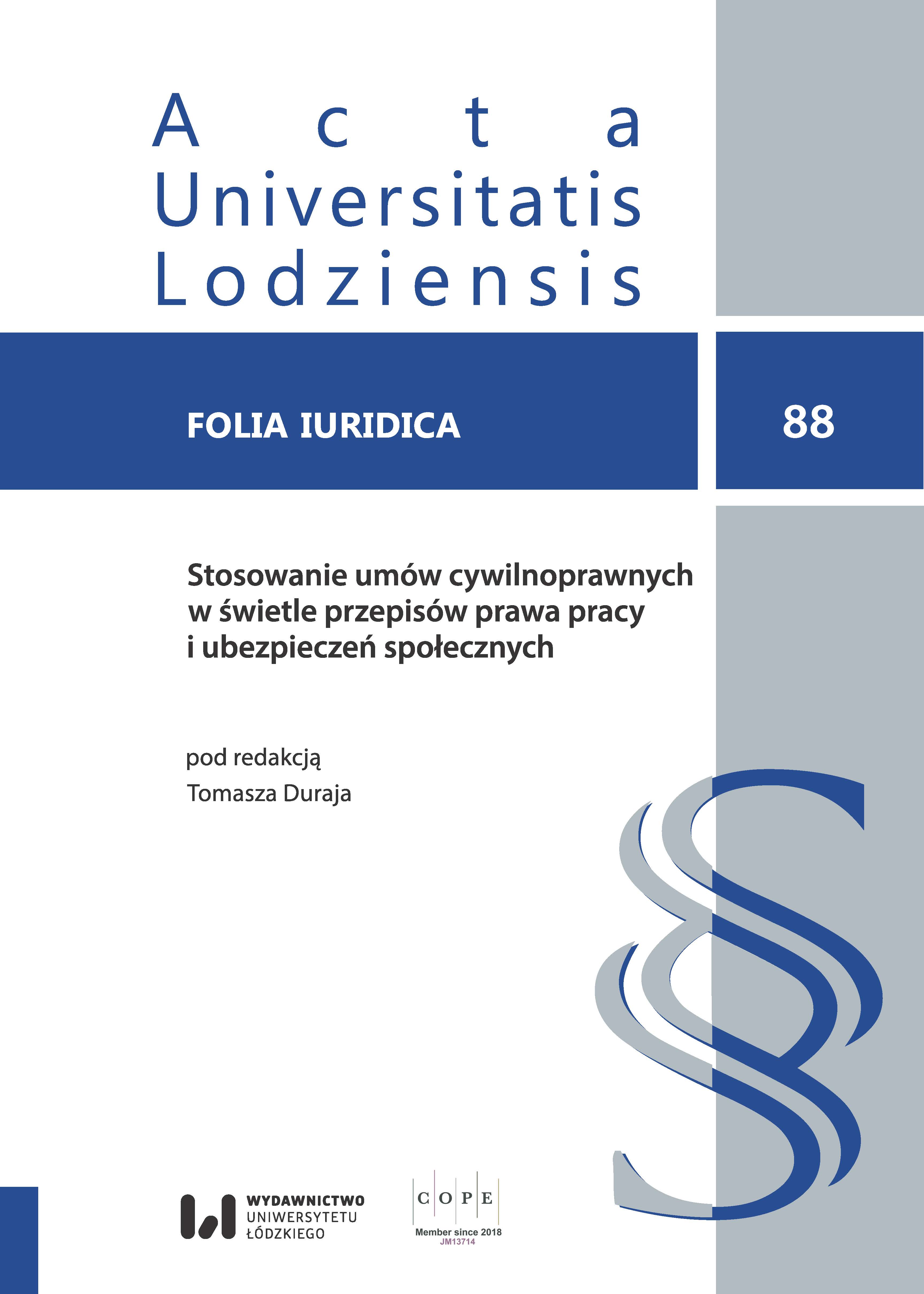Jak chronić prawa podstawowe własnych obywateli w sytuacji prymatu prawa unijnego? Garść refleksji na kanwie orzecznictwa FSK i TSUE dotyczącego Europejskiego Nakazu Aresztowania (ENA)
DOI:
https://doi.org/10.18778/0208-6069.88.15Słowa kluczowe:
tożsamość konstytucyjna, kontrola tożsamości, dialog międzysądowy, prawa podstawowe, system multicentrycznyAbstrakt
Orzeczenie niemieckiego Federalnego Trybunału Konstytucyjnego (FSK) z 14 grudnia 2015 r. w sprawie Identitätskontrolle ma kluczowe znaczenie dla rozumienia granic możliwości ochrony krajowych praw podstawowych w Unii Europejskiej. FSK de facto przeprowadził w nim kontrolę zgodności wynikającego z prawa Unii Europejskiej obowiązku bezwarunkowego wykonania Europejskiego Nakazu Aresztowania (ENA) z konstytucyjnymi gwarancjami ochrony prawa do godności, ostatecznie jednak dochodząc do wniosku, że gwarancje konstytucyjne zasadniczo pokrywają się z unijnymi. Wydając swoje orzeczenie, choć było ono ewidentnie różne od dotychczasowego orzecznictwa TSUE na temat ENA, FSK stwierdził brak potrzeby zadania pytania prejudycjalnego. Pomimo to, w ewidentny sposób orzeczenie to wpłynęło na późniejszy rozwój orzecznictwa TSUE, przede wszystkim na wyrok w sprawie Aranyosi i Căldăraru. Ponadto wydaje się, że w znacznym stopniu wpłynęło ono także na dalszą dynamikę relacji pomiędzy krajowymi sądami konstytucyjnymi a TSUE w zakresie ochrony praw podstawowych. Tym samym można nawet posunąć się do stwierdzenia, że ma ono kluczowe znaczenie dla zrozumienia dynamiki procesu dialogu sądowego wewnątrz UE.
Pobrania
Bibliografia
Amalfitano, Chiara, Oreste Pollicino. 2018. Two Courts, two Languages? The Taricco Saga Ends on a Worrying Note, https://verfassungsblog.de/two-courts-two-languages-the-taricco-saga-ends-on-a-worrying-note/, post z 6 czerwca 2018 r. [dostęp 10.06.2018].
Google Scholar
Anagnostaras, Georgios. 2016. “Mutual confidence is not blind trust! Fundamental rights protection and the execution of the European Arrest Warrant: Aranyosi and Caldararu”, Common Market Law Review 53: 1675–1704.
Google Scholar
Bárd, Petra. 2018. “Saving EU Criminal Justice Proposal for EU-wide supervision of the rule of law and fundamental rights”. CEPS Papers in Liberty and Security in Europe 1: 1–25.
Google Scholar
Bogdandy Von, Armin, Stephan Schill. 2017. „Artikel 4 EUV”. W Das Recht der Europäischen Union. Red. Eberhard Grabitz, Meinhard Hilf, Martin Nettesheim. München: C.H. Beck.
Google Scholar
Burchardt, Dana. 2016 „Die Ausübung der Identitätskontrolle durch das Bundesverfassungsgericht”. Zeitschrift für ausländisches öffentliches Recht und Völkerrecht 76: 527–551.
Google Scholar
Callies, Christian. 2016. „Artikel 24 abs. 1”. W Grundgesetz. Kommentar. Red. Theodor Maunz, Günter Dürig et al. München: C.H. Beck.
Google Scholar
Cloots, Elke. 2015. National Identity in EU Law. Oxford University Press.
Google Scholar
Dovhań, Halyna. 2018. „Tożsamość konstytucyjna w acquis constitutionnel Sądu Konstytucyjnego Republiki Włoskiej: sprawa Taricco”. Europejski Przegląd Sądowy 7: 11–20.
Google Scholar
Golecki, Mariusz Jerzy. 2015. „Judicial Dialogue and the New Doctrine of Constitutional Sovereignty in Judgments of Central European Constitutional Courts”. W IX World Congress of Constitutional Law (Oslo, 16–20 June 2014). Contributions by Polish Scholars. Red. Krzysztof Budzidło. Warszawa: Wydawnictwo Trybunału Konstytucyjnego.
Google Scholar
Halmai, Gabor. 2017. Constitutional Court Decision on the Hungarian Government’s Constitutional Identity Defence, https://blogs.eui.eu/constitutionalism-politics-working-group/constitutional-court-decison-hungarian-governments-constitutional-identity-defense/ 17 stycznia [dostęp 10.06.2018].
Google Scholar
Hillgruber, Christian, Christoph Goos. 2011. Verfassungsprozessrecht. Wyd. 3. Heidelberg: CF Müller.
Google Scholar
Koncewicz, Tadeusz Tomasz. 2015. „Constitutional Identity in the European Legal Space and the Comity of Circumspect Constitutional Courts”. Gdańskie Studia Prawnicze 33: 195–215.
Google Scholar
Krämer, Rike, Judith Janna Märten. 2015. „Der Dialog der Gerichte – die Fortentwicklung des Persönlichkeitsschutzes im europäischen Mehrebensystem”. Europarecht 2: 169–189.
Google Scholar
Lang, Andrej. 2018. „National Courts ultra vires review of the ECB’s policy of quantitative easing: An analysis of the German Constitutional Court’s preliminary reference order in the PSPP case”. Common Market Law Review 55: 923–951.
Google Scholar
Lenaerts, Koen. 2017. „La vie après l’avis: Exploring the principle of mutual (yet not blind) trust”. Common Market Law Review 54: 805–840.
Google Scholar
Lenaerts, Koen, Ignace Maselis, Kathleen Gutman. 2014. EU Procedural Law. Oxford University Press.
Google Scholar
Mei van der, Anne Pieter. 2017. „The European Arrest Warrant system. Recent developments in the case law of the Court of Justice”. Maastricht Journal of European and Comparative Law 24: 882–904.
Google Scholar
Nowag, Julian. 2016. „EU Law, Constitutional Identity, and Human Dignity: A Toxic Mix?”. Common Market Law Review 54: 1441–1454.
Google Scholar
Ostropolski, Tomasz. 2016. „Naruszenie praw podstawowych jako przesłanka odmowy wykonania ENA – uwagi do wyroku Trybunału Sprawiedliwości z 5.04.2016 r. w sprawach połączonych C-404/15 Aranyosi i C-659/15 PPU Căldăraru”. Europejski Przegląd Sądowy 11: 20–26.
Google Scholar
Reestman, Jan-Herman, Leonard Besselink. 2016. „Sandwiched Between Strasbourg and Karlsruhe: EU Fundamental Rights Protection”. European Constitutional Law Review 16: 213–222.
Google Scholar
Schima, Bernhard. 2015. Das Vorabentscheidungsverfahren vor dem EuGH. Unter besonderer Berücksichtigung der Rechtslage in Österreich und Deutschland. Mainz: C.H. Beck.
Google Scholar
Skomerska-Muchowska, Izabela. 2018. „The Dialogue of CEE Constitutional Courts in the Era of Constitutional Pluralism”. W Transnational Judicial Dialogue on International Law in Central and Eastern Europe. Red. Anna Wyrozumska. Lódź: Wydawnictwo Uniwersytetu Łódzkiego.
Google Scholar
Staśkiewicz, Wiesław (red.). 2011. Konstytucje państw europejskich. Warszawa: Wydawnictwo Sejmowe.
Google Scholar
Taborowski, Maciej. 2016. „Znaczenie art. 53 Karty Praw Podstawowych Unii Europejskiej dla poziomu ochrony praw podstawowych w krajowym prawie konstytucyjnym”. Państwo i Prawo 70: 40–57.
Google Scholar
Pobrania
Opublikowane
Jak cytować
Numer
Dział
Licencja

Utwór dostępny jest na licencji Creative Commons Uznanie autorstwa – Użycie niekomercyjne – Bez utworów zależnych 4.0 Międzynarodowe.














